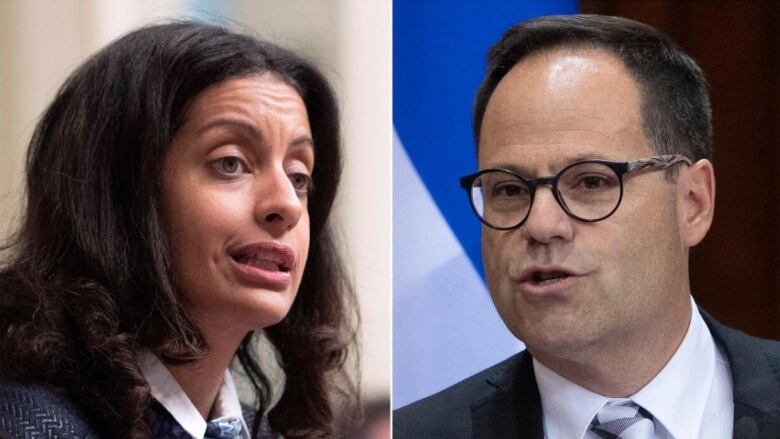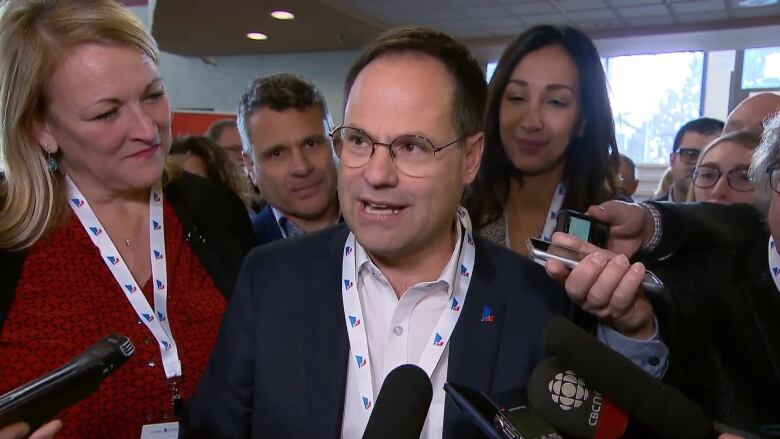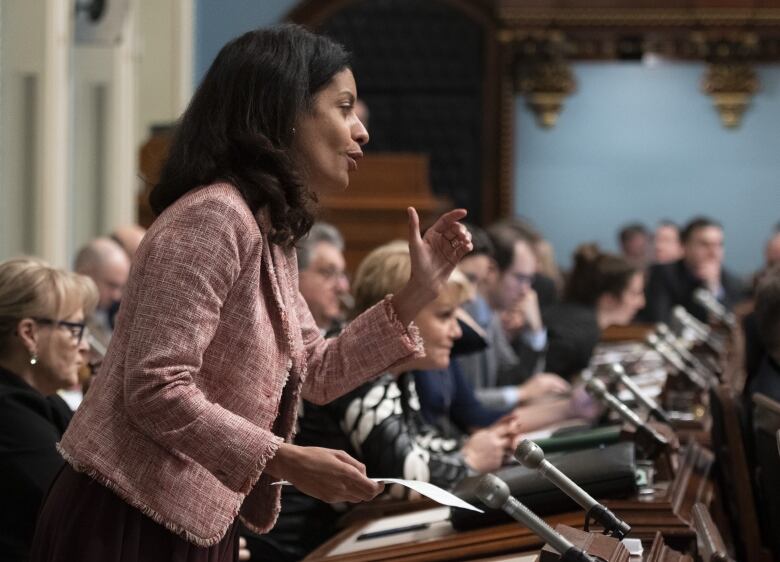As Quebec Liberal leadership race begins, is it urban vs. rural or left vs. right?
In one corner, big-city MNA Dominique Anglade, in the other small-city mayor Alexandre Cusson

There was a momentin the aftermath of the Quebec Liberal Party's humbling defeat in last year's electionwhen it seemed like a leadership race would be unnecessary.
One after another, big-name Liberals passed on the chance to takeover from Philippe Couillard, who left the party with its smallest caucus since Confederation.
The lone figure to step forward was former economy minister andSaint-HenriSainte-Anne MNA Dominique Anglade.
She quickly garnered the support of several fellow caucus members and appeared destined for a cake-walk to the leadership.
But a challenger emerged earlier this month from the unlikeliest of places small-city municipal politics. On Saturday, Alexandre Cusson, the mayor of Drummondville (population 70,000),officially put his name forward.
So the race is on!
Well, sort of.Cusson launched his campaign with an impressive display of fence-sitting.

He made precisely zero policy commitmentswhen he met with curious journalists at this weekend's meeting of Liberal party members in Sherbrooke.
Cussondeclined, for instance,to take a stand on the secularism law, also known as Bill 21,arguably the defining issue of the Coalition Avenir Qubec's first year in government.
Nor did Cusson care to weigh in on whether he supports a proposednatural gas pipeline project that would run through northern Quebec, one thathas environmentalists concerned.
"I don't want to get into specifics," he said Saturday, preferring not to hurt anyone's feeling out of the gate.
He declared climate change to be the next great challenge for the province,but also promised "pragmatic" solutions.
He said the Liberals need to do more to listen toold-stock Quebecers (Qubcois de souche), and then said the term included minorities.
And he vowed both not to be a stooge for big corporations, and not to intervene excessively in the economy.
To be fair, Cusson's plan is to spend the next several weeks consulting party members before drafting a program with actual policy positions.
"I've never brought people together by imposing my views," he told Radio-Canada on Sunday. "I've brought people together by listening to them."
The big city MNAand the local mayor
Anglade, on the other hand, has spent recent days outlining her proposals for dealing with Bill 21 (let the notwithstanding clause lapse), climate change (make Quebec carbon neutral) and regional economic development (support natural resource development).
"We want to have a debate about ideas, but there needs to be some ideas for that to happen,"Angladesaid, taking a shot at her opponent'stimid campaign launch. "We await them with impatience."

In the absence of an understanding about what Cusson stands for,gadflies and party mandarins have offered their own interpretations of what's at stake so far in the leadership race.
The most popular view at the moment is that with a Montreal MNA in one corner, and small-citymayor in the other, the race is pitting urban values against rural ones.
It's easy to see why this perspective is appealing.
Following the last election, the Liberals found themselves with precious little support outside the island of Montreal.In order to have a chance atdislodgingthe CAQ, they need to find a way to reach francophone voters outside the metropolis.
Cusson, according to La Presse, was enticed to run by party officials who believe his background gives the party a better shot at making inroads in the regions.
On Sunday, journalists asked Anglade whether being the child of Haitian immigrants would hinder her campaign outside Montreal. Quebecers, she said, are "beyond that."
Is the way forward left or right?
But the idea thatAnglade andCussonrepresenttwo poles in a contest over urban and rural values only holds if you ignorea fair bit of political context.
For starters, Angladewas once a senior official in the CAQ, once ran for the party, and her position on religious symbols is at odds with those traditionally held by the Quebec Liberals.

On Bill 21, she's onlysaid she would let the courts decide whether the law should stand, and hasn't committedto repealing the law altogether.
The head of the Liberal'scultural communities committee,Mohammed Barhone, called Anglade's nationalist turn"risky" and full of "grey areas."
On top of that, portraying places like Drummondville as cultural and economic backwaters, composed of anti-immigrant sentiment, is to miss what's been happening outside Montreal over the past 10 years.
As mayor, Cusson has spent significant amounts of his time trying to attract immigrants to his city, whose booming economy has left it facing a serious labour shortage.
And as the formerpresident of the Union des municipalits du Qubec, Cusson is well aware that dozens ofsmall cities and towns in Quebec also have low unemployment as they embrace new economic opportunities. They too badly need immigrant labour.
The idea of a race divided by an urban and a rural candidate may bedisguising a more complicated question the Liberals needto resolve before they shifttheir attention to the next election: Is it a party of the leftor the right?
When its main opponentwas the sovereigntistParti Qubcois, it could take a fuzzy line on its interest in social democracy. The important thing was being federalist.
But with the advent of the CAQ, and its brand of conservative nationalism, that's no longer enough.
The CAQ'svictory last fall reshaped Quebec's political spectrum. Now voters are waiting to see where the Liberals will place themselves on it.












_(720p).jpg)


 OFFICIAL HD MUSIC VIDEO.jpg)
.jpg)



























































































